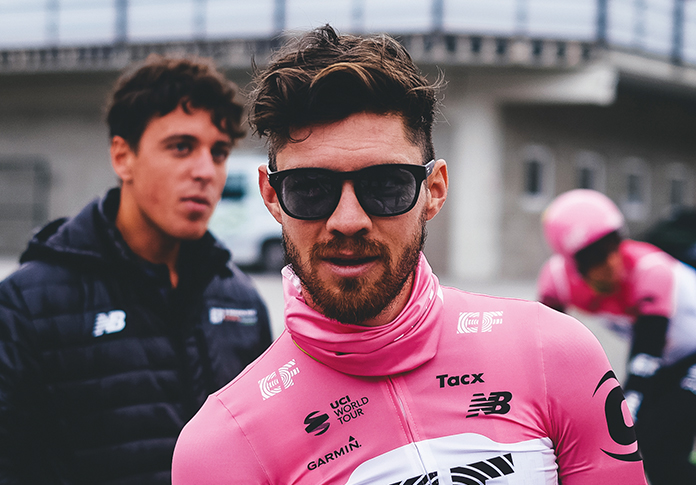
The Tour de France might be over, but here at EF, our fascination with pro cycling has only just begun. To learn more about the sport, we spoke with Alex Howes, a rider on our very own UCI WorldTeam. (That’s right, we have one.) We discussed everything from the importance of cultivating trust among riders to the plight of shaving legs before race days. You know, the important stuff.
Sarah Bennett: A lot of people think professional cycling is an individual sport and don’t understand the level of teamwork that goes into it. How does teamwork actually come into play?
Alex Howes: It’s on the road and it’s off the road. On the road, we usually have a designated team leader and that’s the guy who everybody hopes will win. The rest of us provide support in terms of food and water—we go back to the cars to get rain jackets and gloves and stuff like that if the weather’s bad.
Also, there’s quite a bit of drafting involved. We try to break the wind and get our guy in the right position as best as we can, leading into either the final climb or the final spurt.
Then off the bike, there’s quite a bit of camaraderie. We travel all over the world. We probably spend more time with our teammates than we do with our significant others. You need to have a good team atmosphere and a good group. If you don’t have that, you have no chance of success.
SB: It looks like you’ve had some first-place wins yourself, and also ridden to support other riders on your team. Can you tell me a little bit about both experiences?
AH: One of my favorite races is the USA Pro Challenge, which is now the Colorado Classic. I’m from Colorado, so I like to perform there for the hometown crowd. I’ve won a couple of races there. For me, winning on home soil is pretty incredible, but at the same time, there’s a lot of satisfaction in riding in support of other riders. I was part of the team when Andrew Talansky won the Critérium du Dauphiné, which is probably the hardest, fastest week-long stage race in Europe and, therefore, the world. That was pretty exciting. That was definitely as gratifying as winning a race myself.
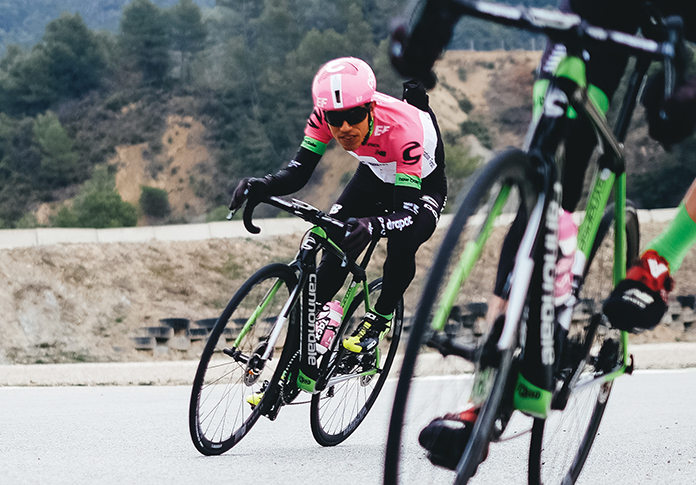
SB: So, do you feel like as long as you’re supporting your team leader, it feels like a win for the whole team rather than the one rider who crosses the finish line?
AH: It’s related to baseball or football. Not everybody is going to score the winning touchdown or throw the final strike, but in the end, it takes everybody on the team to make that win happen.
SB: And even when the race isn’t in Colorado, does it feel like you’re racing for your home team?
AH: This team is definitely my home team in a lot of different ways. I’ve been with the organization my entire career, more or less. I left for one year, we call it study abroad, with the French team. But I started with [Team CEO and co-founder Jonathan Vaughters’] junior development team here in Colorado and I’ve been with the team ever since. It feels as much like a family as it does a team. Calling it a home team is almost an understatement for me.
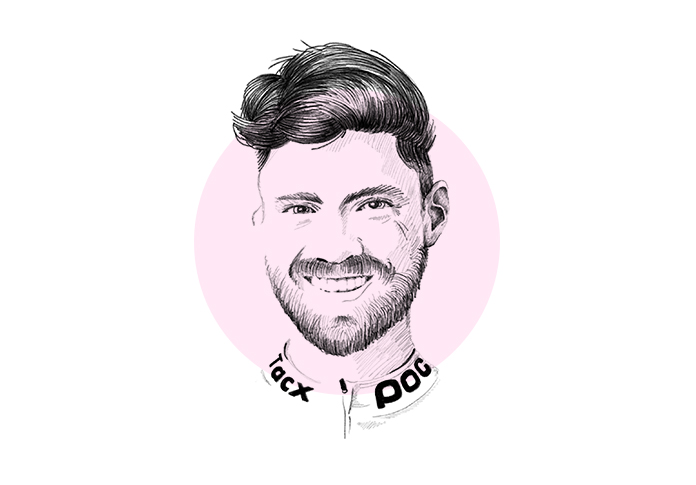
SB: Speaking of the team, your teammates hail from 13 different countries. What’s it like being on a team with people from all over the world?
AH: It’s interesting. It’s easy to get into the cycling bubble. Obviously, we all have that in common. When you do hard races, a lot of other things tend to fall by the wayside. You’re not really thinking about anything else. At the same time, it’s funny to show up at the training camp in the winter after everyone has been home and really talk about what everybody’s been doing. It’s always so different for everybody.
We have Italian guys that spent the whole winter basically just sitting at their mom’s eating pasta. We’ve got [Rigoberto Uran], who’s basically running an empire down in Columbia. I’m always off in the desert or the mountains doing something like that. I don’t know, it’s a great thing to see so many different people come together to achieve a common goal.
SB: You already covered this a little, but what role do you think trust plays on the team?
AH: Oh my gosh. It comes into play all the time, especially when you’re coming into a sprint finish or a hectic final or even just a stressful moment in the race. We try and ride together as a team as much as we can and we’ll be in one line in a particular part of the peloton [the main group of cyclists in a race].
When you’re following your teammates, you have to have 100 percent absolute trust and faith in them because if they mess up—even just a little bit—you’ll be on the ground. That’s why we ride together as much as we do. We know that the guy in front of us is thinking about the guys behind him. Without trust, that doesn’t work.
Going beyond that, off the road, cycling has had a rough history with doping scandals and things like that throughout the years. With this team, we’ve worked really hard to make sure that everybody on our team is someone we know isn’t doing anything sketchy behind closed doors. If one of us screws up or makes the wrong decisions, it could be costly for the entire team. So you definitely have to have trust in your teammates.
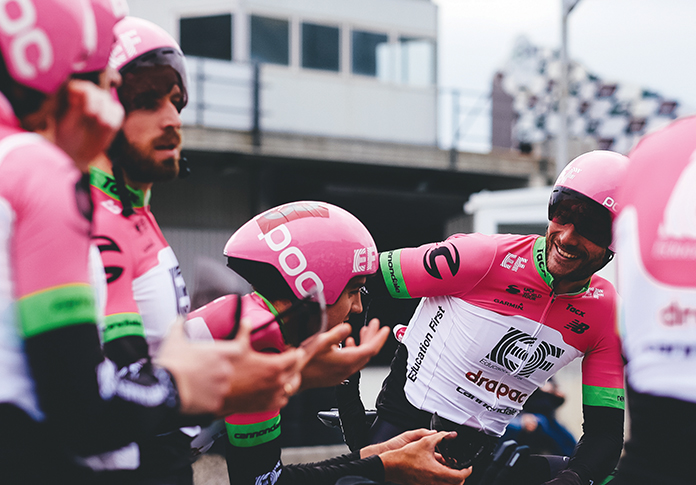
SB: That makes sense. You guys ride together a ton, but also spend a good amount of time training in your own countries. How does that affect training? Do you just have to have trust that your teammates are putting in the work?
AH: It’s funny. We spend a lot of time apart. We spent a lot of time together, too, but when we’re away, a lot of us keep tabs on each other. You know, we kick our buddies in the butt if it sounds like they’re not getting their work done.
We follow each other on various cycling platforms. There’s one called Strava where you upload your rides and everybody can basically see what rides you’ve been doing. If you see one of your teammates is slacking off on Strava, then you call them up and say, “Dude, what’s going on?” Sometimes they’re just screwing up and sometimes it’s more serious and you get to help them out. We may not all be hanging out in the same room together, but we have each other’s backs.
SB: Do you think that being on a cycling team has given you any life lessons or skills that you can take into other areas of your life?
AH: It’s been a strange ride, not going to lie.
SB: No pun intended.
AH: [laughs] Yeah. I remember getting off an airplane in Belgium when I was 15 and looking around and just being like, “Holy crap, I am not in Kansas anymore.”
It’s a sport and a lifestyle where you’re constantly being forced to adapt. You’re always in different countries, different climates, different cultures. If you can’t adapt, you lose. Quite literally. So, I think our ability to adapt and find creative solutions to new and different problems on a daily basis will be extremely valuable going forward.
SB: Do you have any examples of how you’ve learned to adapt to different cultures?
AH: Some of the races we go to we have a chef, but at a lot of the races, we just have a buffet with different foods. When we went to Colombia, for example, the culture shock at the dinner table was pretty extreme. Same for racing in Malaysia or China. We have to be able to make good decisions at the dinner table and figure out what’s going to get us sick and what’s not and what’s going to help us win the next day.
SB: Would you say that cycling has helped you be a better team player or communicator in any other area of your life?
AH: Cycling is an interesting sport in that there are days that you’re just amazing and there are days when you’re just really not amazing at all [laughs]. I think in that regard, it’s given me a lot of empathy because you get to ride in the shoes of a champion one day and then the shoes of a guy just dying in the back the next day. You don’t get that in a lot of sports. Being able to feel all sides of it gives you an interesting perspective.
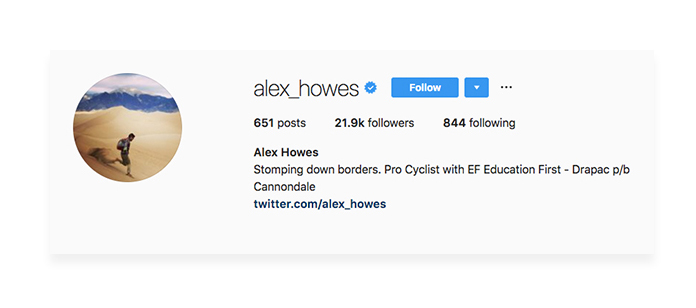
SB: All right, so I saw your Instagram bio. Clearly I did some heavy research…
AH: Stalker.
SB: Comes with the job. Your bio says you’re stomping down borders. Tell me about that.
AH: I don’t know. We’re just always on the go. Personally, I hate borders. I love cultural differences. This idea and concept that people can’t go certain places for political reasons or whatever…I don’t know. I just don’t like it.
SB: Do you think cycling brings people together?
AH: I wouldn’t say that it stomps borders down, but it definitely helps people bridge gaps culturally. It’s an activity where pretty much everybody can do it and it’s common ground for a lot of people. It’s something that people do all over the world. There’s something about two people riding next to each other—things come up that wouldn’t if you were sitting face to face. I guess it’s just an easier way for people to chat.
SB: As a professional cyclist, you also get the chance to travel all around the world. Has that helped you see the world differently?
AH: I think that anytime anyone travels, they get the opportunity to see how different we all are and how different cultures can be—but at the same time, how similar we all are as people. Humans have very basic needs. For the most part, we all have the same goals and desires. It doesn’t matter where you’re from. More or less, everybody just wants to be happy.
SB: Agreed. I want to backtrack a little: How did you first get involved with professional cycling?
AH: Well, I first started racing because my dad used to race. I guess technically he still does from time to time. When I was a little kid, I thought my dad was pretty cool. I still think he’s pretty cool. I wanted to be just like him when I was a little kid and so I started riding bikes and kept pushing him to let me race. I got bit by the bug and kept working my way up.
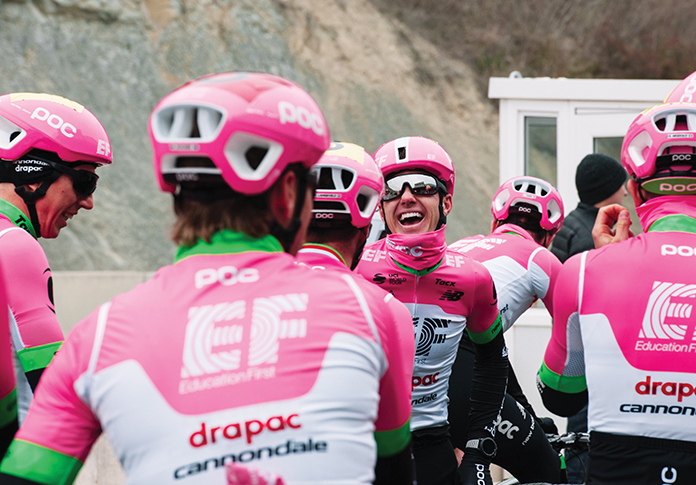
SB: What’s your favorite part about cycling?
AH: My favorite part about cycling today is the same as it was when I first started as a little kid. I always wanted to know what was on the other side of the neighborhood. As I got a little bit older, I wanted to know what was on the other side of town, and I wanted to know what was on the other side of the other town, and I wanted to know what was on the other side of the mountain. And then I wanted to know what was on the other side of the mountain range.
I just kept pushing out, pushing out, pushing out. I just wanted to see things. I think that’s pretty much the same thing now. I really enjoy it. I want the adventure. I want to get out there.
SB: I love that. Okay, one more question. Cycling is not a very well-followed sport here in the States. It doesn’t have the same following that it does in other parts of the world. What’s something you’d like our audience to know about cycling?
AH: Well, we don’t all enjoy shaving our legs.
SB: I didn’t even know that was a misconception.
AH: I think the first thing anybody hears about professional cycling is that there’s a big race in France, and the second thing is that we all shave our legs. I think they all assume that we just love shaving our legs and I freaking hate shaving my legs.
SB: I think we all do.
AH: Yes. You can always tell when my last race was based on how hairy my legs are.
SB: Got you. Well, this is definitely good information. We’ll make sure to pass it along.
Still curious why EF has its own cycling team? Really, it makes perfect sense. EF’s mission has always been Opening the World Through Education to promote cross-cultural connections. And with members hailing from 13 countries and a fan base that spans continents, our cycling team serves as another way to bring a diverse group of people together. Plus, we all hate shaving.
Related articles
